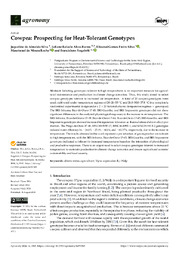Cowpea: prospecting for heat-tolerant genotypes.
Cowpea: prospecting for heat-tolerant genotypes.
Autoria: SILVA, J. de A.; BARROS, J. R. A.; SILVA, E. G. F.; ROCHA, M. de M.; ANGELOTTI, F.
Resumo: Selecting genotypes tolerant to high temperatures is an important measure for agricultural maintenance and production in climate change scenarios. Thus, this study aimed to select cowpea genotypes tolerant to increased air temperature. A total of 20 cowpea genotypes were used, cultivated under temperature regimes of 20–26–33 °C and 24.8–30.8–37.8 °C in a completely randomized experimental design under a 2 × 20 factorial scheme (temperature regimes × genotypes). The BRS Inhuma, Bico-de-Ouro-17-45, BRS Guariba, and BRS Imponente genotypes did not show significant differences in the analyzed physiological responses to the increase in air temperature. The BRS Inhuma, Bico-de-Oouro-17-19, Bico-de-Ouro-17-44, Bico-de-Ouro-17-45, BRS Guariba, and BRS Imponente genotypes showed increased temperature tolerance as thermal stress did not affect production. The Pingo-de-Ouro-17-48, MNC00-595F-27, MNC06-895E-1, and MNC09-981B-2 genotypes reduced water efficiency by ?26.85, ?25.19, ?40.04, and ?60.37%, respectively, due to the increase in temperature. The results obtained in this work represent a pre-selection of genotypes that are tolerant to high temperatures, with the BRS Inhuma, Bico-de-Ouro-17-45, BRS Guariba, and BRS Imponente genotypes indicated as tolerant to increased temperatures based on the interaction of physiological and productive responses. There is an urgent need to select cowpea genotypes tolerant to increased temperature to maintain production in climate change scenarios and ensure agricultural systems’ sustainability and food security.
Ano de publicação: 2024
Tipo de publicação: Artigo de periódico
Unidade: Embrapa Meio-Norte
Palavras-chave: Abiotic stress, Agriculture, Aumento da temperatura do ar, Cowpeas, Estresse abiotico, Feijão, Feijão caupi, Genótipo, Mudança Climática
Observações
1 - Por padrão são exibidas publicações dos últimos 20 anos. Para encontrar publicações mais antigas, configure o filtro ano de publicação, colocando o ano a partir do qual você deseja encontrar publicações. O filtro está na coluna da esquerda na busca acima.
2 - Para ler algumas publicações da Embrapa (apenas as que estão em formato ePub), é necessário ter, no celular ou computador, um desses softwares gratuitos. Sistemas Android: Google Play Livros; IOS: iBooks; Windows e Linux: software Calibre.
Acesse outras publicações
Acesse a Base de Dados da Pesquisa Agropecuária (BDPA) para consultar o acervo completo das bibliotecas da Embrapa.

